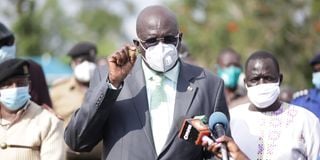Premium
Magoha wants caning reintroduced in schools to tame indiscipline

Education Cabinet Secretary George Magoha at Ombaka Secondary School in Nyando, Kisumu on January 8, 2021.
What you need to know:
- Magoha said students expelled for misconduct will not be admitted to other schools
- The CS was reacting to spiralling wave of student unrest that has hit schools barely three weeks after reopening.
Caning could soon find its way back into schools to deal with unruly learners if Education Cabinet Secretary George Magoha has his way and overturns regulations that outlawed corporal punishment.
Additionally, students expelled from school for grave misconduct may as well forget about education as Prof Magoha yesterday directed that they should not be admitted to other schools.
The CS’s directive goes against official government policy on children’s right to education.
Prof Magoha was reacting to spiralling wave of student unrest that has hit schools barely three weeks after reopening, and has seen property worth millions of shillings reduced to ashes.
A number of schools have already been closed and several students arrested, with some facing charges in court. Prof Magoha yesterday announced that Health ministry officials will soon start visiting schools to randomly test students for drugs, after suspicion that the indiscipline is being fuelled by drug abuse.
“Learners will not commit crimes and walk scot-free, we must curb the situation before it worsens. If learners burn a building or do something wrong, they must be caned hence need to give teachers power to punish them,” Prof Magoha said. He was speaking in Kisii County, where he tasked school managers to put in place measures to curb juvenile delinquency.
“We are working with the Department of Criminal Investigation (DCI) to ensure that children who commit crimes are investigated, even after school. Those who will be found guilty of burning schools will pay the cost of rebuilding them through their parents,” the CS said, in reference to the announcement by the DCI that it will create a database of student criminals, with such information being used against them in the future. Corporal punishment was outlawed in schools in 2001 after enactment of the Children’s Act. The law seeks to protect children from violence and abuse.
Section 191 (2) of the Act states: “No child offender shall be subjected to corporal punishment.”
Earlier in the day, Prof Magoha had instructed schools to deny admission students who get expelled for gross misconduct.
Expelled students, however, will be allowed to appeal such decisions, and may be considered for readmission.
Corporal punishment
The call to reintroduce the cane comes barely two days after a section of the clergy in Migori challenged him to reintroduce corporal punishment.
Led by Bethel Church of East Africa Cardinal Tobias Okumu, the church leaders maintained that the government policy to ban corporal punishment in schools had allowed the rampant indiscipline to thrive among learners.
Prof Magoha said students abusing drugs are more likely to burn down or destroy school property.
He told teachers to prepare for impromptu visits by health officers accompanied by officials from his ministry.
Education stakeholders have raised concerns that students could have been hooked to drugs during the long Covid-19 break.
“We will soon find out students who are on active drug abuse. Some students could be abusing drugs in school after having easy access to them while at home,” the CS said.
He asked teachers and boards of management to discipline students after he accused some parents of failing in their roles. Prof Magoha said teachers should be proactive in ensuring students follow rules set by their schools.
Teachers will be required to monitor learners’ movements and inspect every corner of their schools where drugs could be hidden.
“Some parents have failed in their role of bringing up their children. A child needs your time not your money. Some think that teachers have magic to control their children,” Prof Magoha observed. He said parents whose children burn down schools and destroy property will be held responsible for rebuilding the damaged infrastructure.
Reporting by Benson Ayienda, Ian Byron and George Odiwuor





